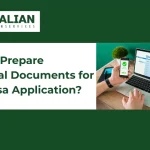Exploring the process of how to get a death certificate in Australia as a foreigner or an overseas resident can depend heavily on where the death occurred. There are generally two scenarios:
1. A foreign national passes away within Australia
2. The death of an Australian citizen is registered abroad
The legal steps for registering a death and obtaining an official certificate vary depending on the situation. In this article, we will discuss both scenarios in depth.
Additionally, certified translation services often play a crucial role in these procedures, ensuring compliance with official Australian requirements (or those of the other country involved) and streamlining the formalities of the certification process. We will also get into it!
But first, let’s understand the importance of a death certificate.
Why Is a Death Certificate Important?
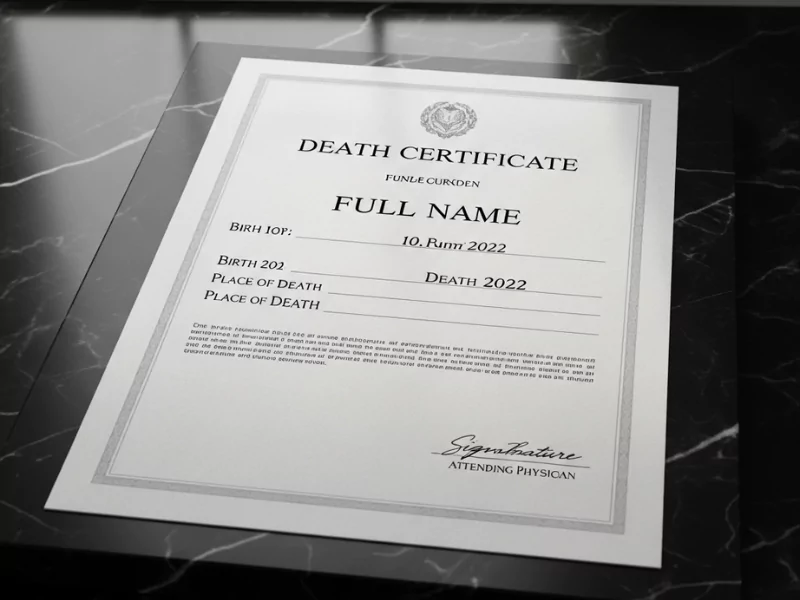
A death certificate is more than a formal record. It plays a crucial role in all areas, including legal, financial, and administrative. Here’s why it is important:
| Purpose | Uses |
|---|---|
| Legal Verification | It provides official proof of death. This is essential for probate, estate management, and legal claims. |
| Financial and Asset Transfers | Banks and insurers require it to close accounts, process life insurance, transfer property, and access superannuation. |
| Government Notifications | Records need to be updated with agencies like Medicare, Centrelink, and the ATO. |
| Funeral Arrangements | Funeral homes and cemeteries use it to complete service, burial, or cremation documentation. |
What Is a Death Certificate Australia for Non-Residents?
When a non-resident or foreigner passes away in Australia, an official Australian Death Certificate is issued. A non-resident death certificate contains the same core information as one for an Australian citizen:
- Full Name
- Gender
- Occupation
- Residential Address
- Date and Place of Birth (the city and country of their birth)
- Parents’ Details
- Marital Status(e.g., married, single, widowed)
- Marriage Details
- Children’s Details
- Date and Place of Death
- Death Registration Number
Is the Non-resident Australian Death Certificate Valid?
Yes, a non-resident death certificate issued in Australia is a legally valid document. This certificate holds the same value as those that would have been issued to citizens by the original country. This serves as original proof of the individual’s death.
Is an Australia-issued Death Certificate of a Foreigner Legally Accepted in the Foreigner’s Country?
For an Australian-issued death certificate to be legally accepted in the deceased’s country of origin (as per their nationality), further steps are typically required.
For example, suppose the deceased’s country is a member of the Hague Apostille Convention. In that case, the Australian death certificate must be authenticated or stamped with an Apostille issued by the Department of Foreign Affairs and Trade (DFAT). This confirms the document’s legal validity for international use.
How to Get an Australian Death Certificate as a Foreign National?
The process for obtaining an official death certificate for a foreign national is the same as for an Australian citizen-
1. Identify the Correct Registry: You must apply to the Registry in the state or territory where the death is registered.
2. Complete the Application Form: These forms are available on the respective Registry’s website. Applications can typically be submitted online, by mail, or in person.
3. Provide Proof of Identity: The applicant must provide certified copies of their identification documents. The specific requirements vary by state but usually involve presenting multiple forms of ID.
4. Pay the Required Fee: A fee is charged for the issuance of a death certificate. The cost can vary between states and territories.
The deceased’s nationality does not alter the fundamental death certificate process. The key is that the death occurred on Australian soil, making it subject to Australian laws and registration processes.
What Is the Fee and Processing Time for Issuing a Death Certificate in Australia?
The associated fees and processing times for a death certificate vary by state or territory. It generally takes 10 to 15 business days to receive the death certificate after the application has been registered with the standard service, which costs $68 (AUD).
In urgent cases, expedited processing may be available upon request with an extra fee.
Once completed, the certificate is either mailed to the applicant or made ready for collection at the local registry office.
Below is a breakdown of the costs and estimated timeframes as per the NSW Registry of Births, Deaths & Marriages:
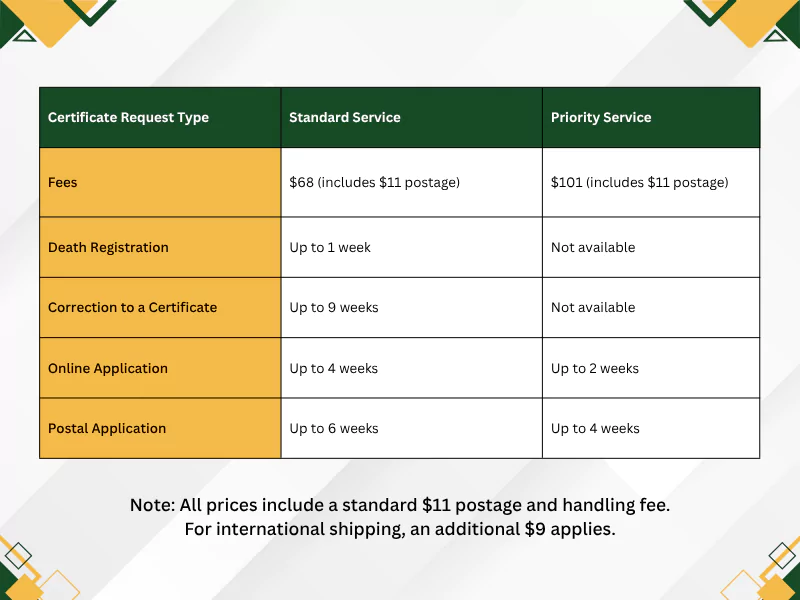
Issuance of Foreign Death Certificates by State or Territory
The official death certificate is issued by the Registry of Births, Deaths, and Marriages in the state or territory where the death occurred.
Each Australian state and territory has its own Registry Body for Births, Deaths, & Marriages. The relevant agencies are listed below, State/Territory-wise:

Note: Each state or territory registry follows its own procedures and timelines for issuing death certificates. It is recommended that the appropriate agency be consulted directly for accurate and up-to-date guidance.
Who Is Responsible for Registering a Death in Australia?
The primary party responsible for registering a death in Australia is the next of kin, who can be a spouse, de facto partner, parent, or child of the deceased.
However, in most cases, the family often engages a funeral director to take on this responsibility, easing the administrative burden during a difficult time.

Apart from the immediate family members and the funeral director, the following parties can also take responsibility to register a death:
- The executor of the deceased person’s estate (a letter of authority is required).
- A solicitor acting on behalf of the next of kin or the estate (a letter of authority is required).
If a death is unexpected, unnatural, violent, or the cause of death is unclear, the Coroner becomes responsible for registering it.
Coroner’s Involvement in Death Registration
When a coroner gets involved, a doctor does not issue a medical cause of death certificate.
Instead, the coroner steps in to investigate. They determine the person’s identity, time, place, and manner of death. The medical cause is also established through the investigation.
After the process is complete, the Coroner shares their findings. These details go to the Registry of Births, Deaths, and Marriages for official registration.
In some cases, an interim or “incomplete” death certificate is issued first. The final cause of death is added once the Coroner concludes the inquiry.
Important Notes: The authority that registers the death must inform the relevant foreign embassy or consulate of the death of one of their nationals without delay. They should also provide a copy of the death certificate upon request.
Is There Any Specific Timeframe for Registering a Foreigner’s Death in Australia?
Yes! The application for registering the death must be done within a specific timeframe, usually 7 days.
Are the Medical Certificate of Cause of Death and the Official Death Certificate the same?
No! Both are different with unique purposes.
The Medical Certificate of Cause of Death (MCCD) is a clinical document issued by a doctor or coroner that states the medical reason a person died.
The official Death Certificate is the government-issued legal document that proves the death occurred and is required for all administrative and legal purposes.
Crucially, an official Death Certificate cannot be issued until the death has been medically certified via an MCCD or a coroner’s finding; the medical certificate is a mandatory prerequisite for the legal certificate.
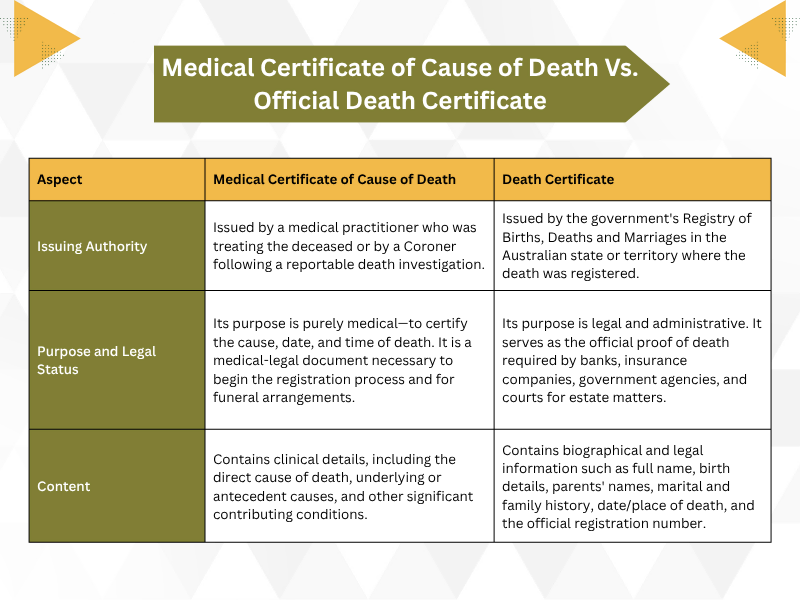
How Long Does it Take to Get a Medical Certificate of Cause of Death?
A Medical Certificate of Cause of Death is generally provided within 48 hours of the death. The doctor gives this certificate to the funeral director or the person arranging the funeral.
What Is the Role of Certified Translation While Issuing a Non-resident Death Certificate in Australia?
Whether issuing a non-resident death certification in Australia, the selected language is generally English. Now, the need for certified translation is required in two general scenarios:
1. If the deceased’s personal identification documents (such as a foreign birth certificate or passport) are not in English.
2. If the official language of the deceased’s country where the certificate will be used is not English.
In both scenarios, two-way translation by a NAATI accredited translator is generally required; otherwise, the translated copies will not be considered valid for either legal processing or official acceptance.
Translation Need for Complex Scenarios
In complex scenarios where a death in Australia is subject to a coronial investigation, the process can extend beyond Australian jurisdiction.
Foreign governments may have a legal or administrative requirement to review the official findings, reports, and evidence from the Australian Coroner before closing their own case or processing related matters.
A critical requirement in this cross-border exchange is language accessibility.
Suppose the official language of the foreign country is not English. In that case, its authorities will mandate that all Australian documents be accompanied by certified translations to ensure their validity and usability for any further processing or re-investigation.
Is it Possible to Apply for Death Certificate in Australia from Overseas?
No. When the death of an Australian resident is reported overseas, the primary document of the death certificate will always be a foreign country-issued certificate. In other words, you cannot apply for a standard Australian death certificate for a death that happened abroad.
Instead, you can apply to have the foreign death registered in Australia, which results in an official Australian record of the overseas death. This record is based on the primary death certificate issued by the country where the death took place.
The process is managed by the Registry of Births, Deaths, and Marriages in the Australian state or territory where the deceased was a resident or owned property.
Why Register an Overseas Death in Australia?
While not mandatory, registering an overseas death in Australia can be beneficial for several reasons:
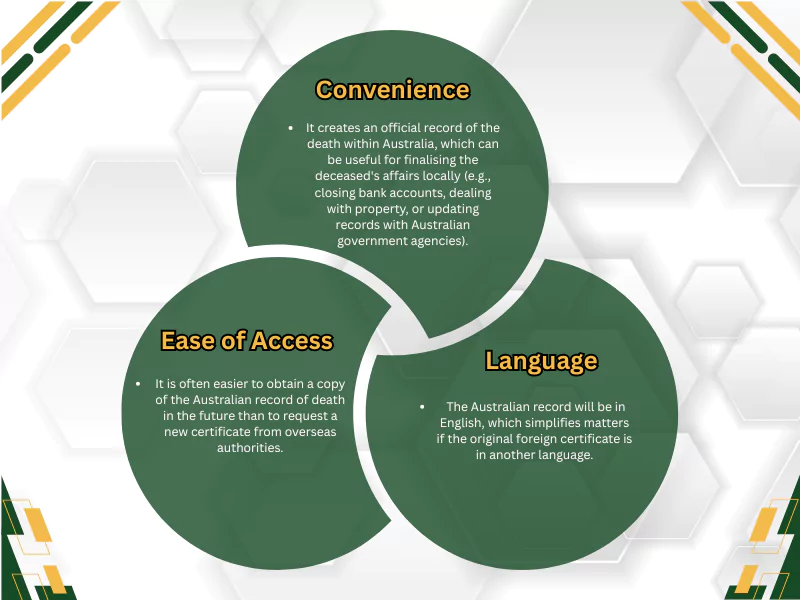
How to Register an Overseas Death and Get the Record?
Here’s the step-by-step process of a Death Certificate Request from Abroad Australia-
Meet the Eligibility
You must be the next of kin (e.g., spouse, partner, parent, or child) or have a legal right to apply (e.g., the executor of the will). The deceased must have been an Australian citizen.
Obtain the Foreign Death Certificate
You must have the official death certificate issued by the country where the death occurred.
Translate the Certificate
If the foreign death certificate is not in English, you must get an English death certificate translation by a NAATI certified translator. To learn more about the process, read our other blog, “How to Get a Death Certificate Translated?“
Complete the Application Form
You need to fill out the specific form for registering an overseas death using the relevant state or territory registry. These are usually available online.
Provide Proof of Identity
You will need to provide certified copies of your own identification documents. If applying from overseas, a Notary Public can typically certify your documents.
Submit Supporting Documents
You will need to submit the original foreign death certificate (or a certified copy) and its English translation, along with proof of the deceased’s Australian citizenship (e.g., their Australian passport or birth certificate).
Pay the Fee
A fee is required to register the death and issue the record.
Formal training is crucial for community interpreters to develop the necessary skills, ethical understanding, and specialised knowledge. Training programs typically cover:
- Interpreting Techniques: Consecutive and simultaneous interpreting, sight translation, note-taking.
- Ethics and Professionalism: Detailed instruction on confidentiality, impartiality, accuracy, and professional conduct.
- Terminology: Specialised vocabulary for medical, legal, and social service contexts.
- Cultural Competency: Strategies for effective cross-cultural communication.
- Role Play and Practice: Hands-on experience interpreting various scenarios.
NAATI Certification is becoming increasingly important, as it demonstrates an interpreter’s competence and adherence to professional standards. Certification often involves rigorous testing of linguistic proficiency, interpreting skills, and ethical knowledge. Many organisations and institutions require certified interpreters to ensure quality and compliance with language access laws.
Conclusion
In conclusion, obtaining a death certificate in Australia as a foreigner or from abroad involves navigating legal requirements, proper documentation, and, often, certified translations. Whether the death occurred within Australia or overseas, understanding the right process and the relevant Registry is essential. Timely action, accurate submissions, and, when necessary, NAATI-certified translations ensure that the certificate is recognised both locally and internationally, helping loved ones manage legal, financial, and administrative affairs with clarity and compliance.
- Who Can Translate Documents for Immigration Australia? - September 18, 2025
- How to Prepare Financial Documents for Your Visa Application? - September 10, 2025
- How to Get a Death Certificate in Australia as a Foreigner and from Abroad? - July 17, 2025




